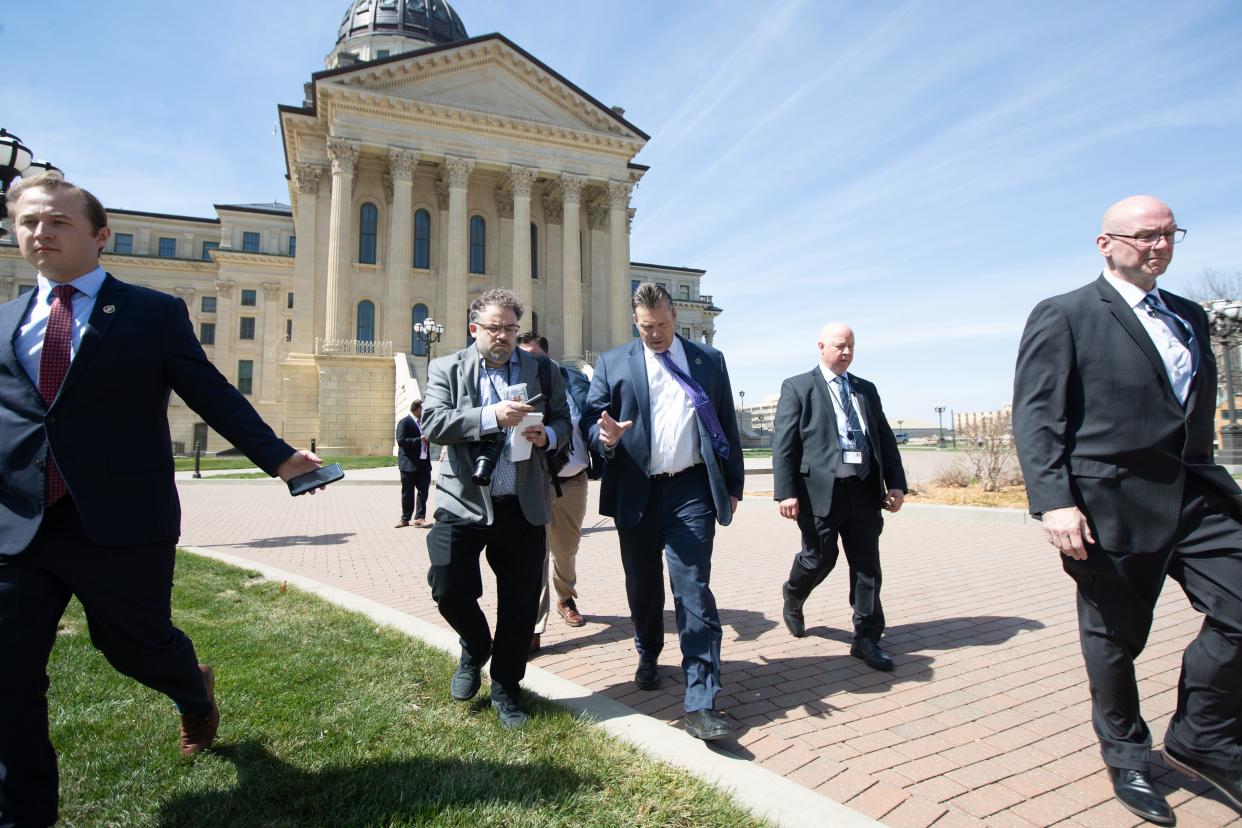What will happen to Joe Biden's student debt SAVE plan? What to know about Kansas lawsuit.
A federal judge in Kansas is expected to decide this summer whether to block a government student loan debt relief program, a decision that would likely have national implications.
Kansas Attorney General Kris Kobach, with the backing of 10 other states, is suing President Joe Biden and his administration over the Saving on a Valuable Education Plan.
Kobach has asked the court to issue a preliminary injunction to block the plan before the U.S. Department of Education rule goes into full effect on July 1. Meanwhile, Biden has asked the court to dismiss the case entirely.
U.S. District Judge Daniel Crabtree is expected to make a decision by late June, if not sooner.
What is the SAVE student debt relief plan?
The SAVE plan is an income-driven plan, meaning loan payments are calculated based on income and family size instead of based on the balance of the loan.
The plan is designed so that lower income borrowers could qualify for total elimination of their monthly payments, while those with middle or higher incomes could see their payments reduced before the loans are ultimately forgiven.
As of March, when Kobach filed the lawsuit in U.S. District Court in Kansas, about 8 million people nationwide were enrolled in SAVE. As of last summer, the White House said that 35,000 Kansas borrowers had enrolled in SAVE.
The administration estimated that more than 20 million Americans could benefit.
"This plan is the most generous repayment program ever," Biden said in February. Kobach in March called the program "profoundly unfair."

Kansas attorney general asks court to block debt relief
After filing the initial lawsuit on March 28, Kobach filed a motion for a preliminary injunction on April 5 to block the program while the litigation continues.
Kobach wants the injunction, if granted, to not only block the Biden administration from implementing the SAVE plan, but also "from undertaking any form of student debt relief not expressly authorized by Congress." Biden has other plans, including a new student debt forgiveness plan unveiled April 8 in a visit to Wisconsin.
"This case is about an administration that is hell-bent on pursuing unlawful administrative action mainly for political gain," Kobach and his team argued in court documents. "Defendants are seeking to forgive hundreds of billions of dollars in student debt with the stroke of a pen."
Kansas is joined by Alabama, Alaska, Iowa, Idaho, Louisiana, Montana, Nebraska, South Carolina, Texas and Utah. The states argue that they will lose millions of dollars in tax revenue, lose workers and suffer other harms unless the court blocks the debt forgiveness program.
Kobach also asked that the injunction apply nationwide, affecting citizens of states that are not parties to the lawsuit.
President Joe Biden wants court to dismiss the case
The U.S. Department of Justice filed a motion to dismiss on April 26, which Kobach has until Friday to respond to.
The federal government argued it has clear authority under federal law to repayment plans that vary based on income, but also contends there is no need to argue the merits of the case because the plaintiffs lack standing to sue.
"Plaintiffs clearly have policy and legal disagreements with the Secretary's approach to student loans, but their standing theories give them no basis to air those grievances in federal court," wrote the attorneys representing Biden, the U.S. Department of Education and Education Secretary Miguel Cardona.
Kobach's team, led by deputy attorney general Abhishek Kambli of Kobach's special litigation division that is tasked with suing Biden, argued the plaintiffs have standing because of alleged harms, including lost tax revenue and difficulty hiring and retaining state employees.
Biden's team argued those two points "are riddled with ... logical inconsistency and speculation" and took issue with arguments on a state-instrumentality theory involving Louisiana, largely because of a lack of facts alleged when the lawsuit was filed. Kobach's side acknowledged that it did not have proof to support that argument when it filed the motion for an injunction.
If the case isn't dismissed, Biden's side has argued against a preliminary injunction.
"As much as Plaintiffs would like to cast themselves as white knights arriving just in time, in reality the Secretary began to implement early loan forgiveness in February, just as the public was notified that he would," Biden's team argued. "An injunction disrupting this ongoing plan would result in chaos and uncertainty."
When will the court decide what happens?
Judge Crabtree had asked Kobach's and Biden's teams to try to agree on a schedule to address the time-sensitive issues, but they didn't find agreement — other than asking for a decision by June 24.
Crabtree wrote on April 16 that standing under Article III of the U.S. Constitution "is a threshold issue the court must address before it considers the merits of plaintiffs' lawsuit," as well as the requested injunction.
Lawyers are now filing briefs on expedited deadlines ahead of a May 31 hearing on the motion to dismiss and — if necessary — a June 11 hearing on the preliminary injunction. Both hearings are at the federal courthouse in Kansas City, Kan.
The judge's order didn't indicate when exactly he expects to issue a ruling.
Crabtree put page limits on their filings that he said would provide "sufficient space" while also requiring the attorneys "to triage their arguments and get to the point quickly."
Jason Alatidd is a Statehouse reporter for The Topeka Capital-Journal. He can be reached by email at jalatidd@gannett.com. Follow him on X @Jason_Alatidd.
This article originally appeared on Topeka Capital-Journal: With Kansas lawsuit, what happens to Joe Biden student debt SAVE plan?
